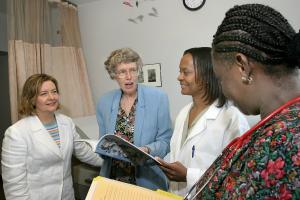|
Issue Date: August 15, 2003
Coalition focuses on plight of 8.5 million uninsured children By ARTHUR JONES The problem is clear: Forty-one million American adults, plus 8.5 million children, have no health care coverage. The consequences are severe:
That’s Sharon Daly’s opening list. But every one of the 600 people attending the June Catholic Health Assembly in Orlando, Fla., could just as quickly list their own horror stories, admitted Daly, Catholic Charities USA vice president for social policy. To galvanize local action on behalf of children, CCUSA has developed a Children’s Health Matters coalition in nine states: Florida, Kentucky, Michigan, Missouri, New Jersey, New York, Ohio, Pennsylvania and South Carolina. Daly and fellow panelists, in a “Ministering Together” session, probed who “is missing out on essential medical services” while describing efforts “to make a dent in this mess.” The Catholic efforts are two-fold: closer national collaboration among major Catholic groups to press for universal coverage, and a replication at the local level to meet local needs by stretching available dollars and services to snapping point. In the last Health Beat (NCR, Aug. 1), Peter Feuerherd reported from Brooklyn, N.Y., on local level collaboration operating under the “New Covenant” banner. The four-day assembly here had many variations on that theme. Running parallel to “Ministering Together,” a “While the Coverage Debate Lingers” session described Catholic clinics and medical outreach from Grand Junction, Colo., to Grand Rapids, Mich., to Austin, Texas (see accompanying story).
A key issue is the millions of children who could be covered for existing programs -- Medicaid or CHIP (state Child Health Insurance Programs) -- but haven’t been registered. Not knowing about Medicaid and CHIP is one thing, but filling in the paperwork is itself an enormous barrier, said Charity Sr. Rosemary Donley, professor of nursing at The Catholic University of America in Washington. Children’s Health Matters enrolled more than 100,000 children for coverage in 2002 and helped some 400,000 families to complete their Medicaid and CHIP applications, covering 235,000 children, in the past five years. Donley discovered the difficulty of filling out paperwork when she assigned nursing students “to go through the bureaucracy just as if they were a poor woman or grown mother looking for health insurance for the child.” Hurdle number one: “The Medicaid form requires you … to be able to read at about an 11th grade level” -- a formidable barrier for the average potential Medicaid recipient, who probably has a fifth-grade reading level or faces English as a second language. Donley’s students reported back on the findings and the outcome was that they turned the whole exercise into a training program -- and took their show on the road instructing community groups in how to help people fill out the CHIP and Medicaid paperwork. Hospitals know the sign-up need, said Donley. One hospital in the Washington, D.C., area “pays a company $750 for each person that they add to the insured rolls, using CHIP and Medicaid. I wasn’t trying to get jobs or money for the students,” but develop an action plan other Catholic nursing schools could adopt “to really help Catholic hospitals address the problems of the uninsured.” Bishop Joseph Sullivan, auxiliary in Brooklyn, said New York State has a nine-page Medicaid application. But it was temporarily suspended and a short form substituted when the 9/11 tragedy struck. “Through the United Hospital Coalition, 380,000 people were qualified in a six-month period,” he said. Despite the paperwork, New York has a “successful” 35-county Medicaid managed care system, he said: “[In the Brooklyn diocese] we have over 200,000 enrollees through collaborating with Catholic schools, Catholic Charities and our own health care system. We have a $350 million budget, a terrific staff, and we’re profitable.” Sullivan added another wrinkle to the complexity: “We have a lot of opposition. Family planning advocates and the ACLU [American Civil Liberties Union] would love to see us out of business because we don’t [provide] the reproductive services.” Mark Franken, Migration and Refugee Services director at the U.S. Conference of Catholic Bishops, looked at the health care needs of another coverage-short group: refugees. He said the Catholic Collaborative Refugee Network now links local Catholic Charities Refugee Resettlement Program with arrivals at Catholic hospitals and clinics. Founded in September 2000, the network is now working in 11 dioceses: Baton Rouge, La.; Cleveland; Joliet, Ill.; Phoenix; Pittsburgh, Pa.; Portland, Maine; Richmond, Va.; Rockville Center, N.Y.; St. Petersburg and Tampa, Fla.; and Seattle. Refugees can obtain specialized medical treatment through the network. A side benefit: Many refugees are taking health care jobs. One example: “A Sudanese refugee, severely tortured and rendered paraplegic during interrogation in Sudan, was brought to the United States from a refugee camp in Kenya,” said Franken. The refugee received the immediate treatment he needed “and the brother was trained by the Mercy Care Plan in Phoenix to be a long-term care provider. Initially the thought was for his brother, but a few months after training was complete, Mercy Care Plan actually hired the brother and he’s now working for that system.” The Catholic refugee coalition has another clientele, finding health services for women and girls smuggled into the United States at the rate of 50,000 a year for the sex trade. These “trafficking” victims “are coerced into coming here with promises of jobs and a visa. Trafficking in people has become big business, more lucrative internationally to organized crime than the arms trade.” Victims included four young Mexican girls discovered not long ago in a New Jersey brothel raid, said Franken. “They were age 14 to 16 years old, literally chained to radiators during the day and then forced into the brothel in the evening. They’d already been there for two years, which meant they’d been smuggled in when they were 12 and 13 and 14.” Authorities contacted a Catholic Charities agency with specialized foster care for former girl prostitutes who want to make the transition to a new lifestyle. “These few are just a sampling of far too many,” said Franken. To raise public consciousness, he said, the Catholic Health Association has a poster campaign aimed at emergency rooms and intake facilities, plus training programs for community workers. Catholic Charities’ Daly returned to the problems facing children -- that states like Texas, facing their own financial crises, are cutting back on both Medicaid and CHIP. Nebraska had to cut back on a program it was trying to extend, she said. “Bush administration proposals to cap Medicaid reimbursements to your states really ought to terrify you,” she told gathered health care professionals. “Forty-nine of 50 states have already cut Medicaid or are getting ready to do so. Cap the federal share of Medicaid and you have fewer people getting benefits, or scaled back benefits, or scaled back reimbursements [to providers such as hospitals], or all three.” Arthur Jones is NCR editor at large. His e-mail address is arthurjones@comcast.net
National Catholic Reporter, August 15, 2003 |
 Catholic groups
struggle to meet needs
Catholic groups
struggle to meet needs
